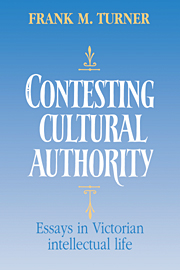Book contents
- Frontmatter
- Contents
- Preface
- I SHIFTING BOUNDARIES
- II SCIENCE AND THE WIDER CULTURE
- 5 Victorian scientific naturalism and Thomas Carlyle
- 6 Rainfall, plagues, and the Prince of Wales
- 7 The Victorian conflict between science and religion: a professional dimension
- 8 Public science in Britain: 1880–1919
- III MODERNS AND ANCIENTS
- Index
8 - Public science in Britain: 1880–1919
Published online by Cambridge University Press: 22 September 2009
- Frontmatter
- Contents
- Preface
- I SHIFTING BOUNDARIES
- II SCIENCE AND THE WIDER CULTURE
- 5 Victorian scientific naturalism and Thomas Carlyle
- 6 Rainfall, plagues, and the Prince of Wales
- 7 The Victorian conflict between science and religion: a professional dimension
- 8 Public science in Britain: 1880–1919
- III MODERNS AND ANCIENTS
- Index
Summary
‘The aim of physical science is to observe and interpret natural phenomena’, declared British physicist James Clerk Maxwell in the South Kensington Museum handbook. Although most of his contemporaries would readily have agreed with Maxwell, presentday intellectual historians and historians of science believe that the analysis and understanding of the Victorian scientific enterprise, as well as of science generally, must extend far beyond the parameters suggested by Maxwell's definition. Numerous recent studies have firmly established that much of the intellectual content, methodological orientation, and professional organization of science cannot be separated from its social and cultural environments even if those environments are not wholly determinant of scientific activity. Scientists in their capacity as observers and interpreters of physical nature still remain part of the larger social order, and between them and it there exists a dialectical relationship of mutual influence and interaction. As one element of this complex situation, scientists find that they must justify their activities to the political powers and other social institutions upon whose good will, patronage, funding, and cooperation they depend. Indeed in the past century and a half no single group of Western intellectuals has more successfully persuaded both governments and private foundations and corporations of their worthiness for receiving financing as have those persons engaged in scientific activity. The body of rhetoric, argument, and polemic produced in this particular process may be termed public science, and those who sustain this particular enterprise may be regarded as public scientists.
- Type
- Chapter
- Information
- Contesting Cultural AuthorityEssays in Victorian Intellectual Life, pp. 201 - 228Publisher: Cambridge University PressPrint publication year: 1993



